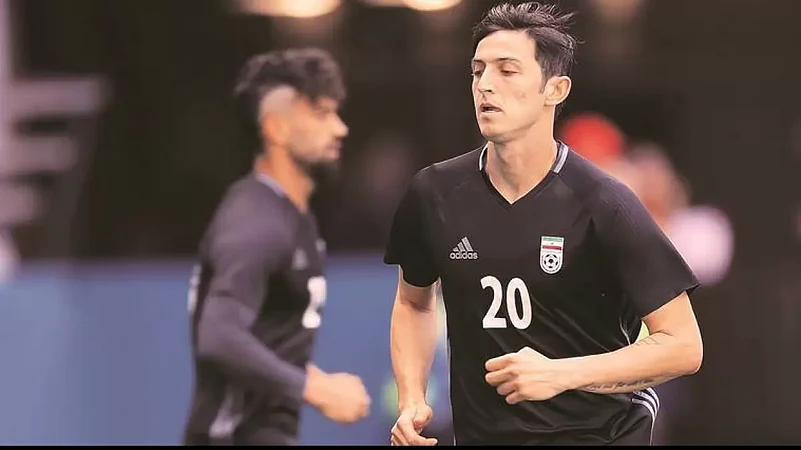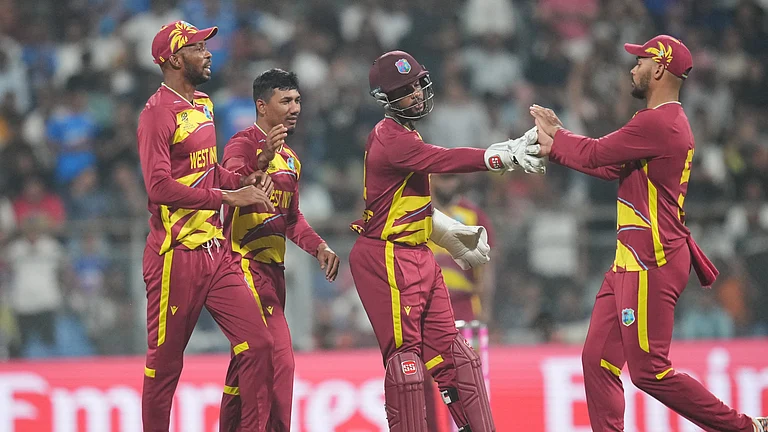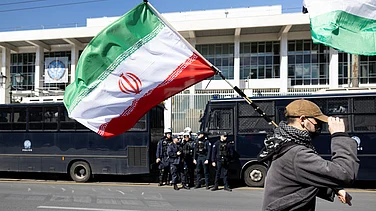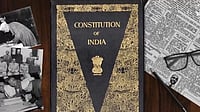Group B during the 2022 Qatar World Cup was probably the most awkward group in the most awkward World Cup venue ever. England, Iran, the United States, and Wales were bunched together in controversy-mired Qatar. A football commentator joked that it was the "Geopolitical Group of Death".
Iran went into the Cup as the ‘Women. Life. Freedom’ movement raged across the once-rich Persian land. Unrest in itself was not new to Iranians. Iran after all has lived through various repressive regimes. It has been subject to foreign domination, from Alexander the Great to Allied Powers lured by oil. But Persian culture and language generally withstood all.
This time, nonetheless, the World Cup team had an emotional connection to the events back home. For football-mad Iran, the national team and Iranian women have long had a symbolic and special relationship. Jafar Panahi’s ‘Offside’ covered this beautifully, tying together women's issues, nationalism, patriarchy, and finally sport as the greater liberator and community bringer.
The 2022 World Cup brought more hope on this front. Iran was present in Doha only because Fifa had forced them to reverse archaic laws that prevented women from going to the stadium to watch a game. With their participation in the planet’s showpiece event at stake, the regime conceded. It was a watershed moment for Iranian women. They showed up when the men of Team Melli, as Iran are known, faced Cambodia. Energised by the support, the players, mostly a foreign diaspora playing across European leagues, thrashed their opponents 13-0.
The historic game was capped off by a heartwarming moment as the national team applauded their female supporters, and the women turned to applaud the lone Cambodian fan who had travelled across the continent with a single drum to cheer for his team.
Then came the World Cup game against England, when the bond built between the fans and the team ruptured.
The Iranian players locked hands as their national anthem started. Eyes dropped, and steely gazes met the TV cameras. The message was loud and clear. They were deliberately not singing the national anthem.
To the foreign watcher, it was a brave show of solidarity from players with those suffering at home. But many Iranian fans and people saw it as tokenism, especially because just a few days earlier, the players had fraternized with government leaders. Fans had expected more from the players privileged enough to wear the Team Melli colours, the most visual representatives of the nation. Some Iranian fans even cheered England and booed their own players as England romped home 6-2. For the Iranian squad, it was a confusing, humiliating experience.
An Iranian expatriate in Delhi put it into context to this writer, "We expected more from the national team. A few days before the tournament, as the protests raged on and the regime was shooting people in the streets, the national team met with the mullahs. They bowed their heads and posed for photographs. They allowed the regime to use them for sports washing (when governments and powerful institutions use sports to repair their own public image)."
The counterpoint was the players had no choice. They had families back at home at the regime’s mercy. Their international careers were at risk. At the same time, if they stood with the government, they invited the wrath of the people, who could not understand why their national heroes, many who had risen from situations like theirs, did not take a stronger stand. For example, Alireza Beiranvand, the team’s goalkeeper, was propelled to stardom from the streets and loved by the people.
The expatriate countered this, saying, "That is the problem. Many of the national team players are hardliners. Vahid Amiri and Mehdi Torabi not only didn’t speak out for the protestors, but they also supported the regime. Beiranvand and Rouzbeh Chesmi were also muted when their people needed them most."
Thus, during England vs Iran, some players were booed while England goals were celebrated. Only one man stood out. Star striker Sardar Azmoun did not start in that match. But when he came on as a substitute, loud cheers rang around the stadium for the forward who was tipped to be the Iranian Messi, and who was the most vocal critic of the regime’s injustices.
As the flame of protest was lit before the World Cup, Azmoun took to Instagram. A translation of his post goes:
“Due to the rules of the National Team, we were not allowed to say anything until the conclusion of our current training camp, but I am no longer able to tolerate silence. If they want to cut me from the team, it would be the sacrifice for a single strand of hair on an Iranian woman. There is no way this post will be erased. Shame on all you how easily [you] murder people. Long live the Iranian women.”
The post was quickly deleted, but Azmoun, all 27, stuck to his guns and re-uploaded his post. His accounts were then deactivated, and he disappeared from the online world. However, Azmoun, who plays in Germany, reiterated that he would not back down. And he did not.
Many other ex-players from Iran also stood with the women, from national legend Ali Daei to former Bayern Munich player Ali Karemi.
Eventually, Azmoun paid the price for his actions. He was sidelined from the national team, then brought back. Recently, he himself announced his withdrawal from the side, citing personal reasons. Yet, everyone who could read the writing on the wall knew the real cause.
The new Iran is disappointed in its athletes, wondering why they pedestalise those who do not care for the people they represent. The exception will be made for Sardar Azmoun though. He had the same fears as any of the other athletes, with family at home and a career on the line. But he prioritised the ‘Women. Life. Freedom’ movement. In a way, Azmoun is just one of the many who have taken a stand. But his was the most influential voice in a charged atmosphere, and he had the courage to use it.
Above all, Azmoun specifically mentioned Mahsa Amini, the young protestor who died in police custody, in his statements.
Sardar Azmoun may have withdrawn himself from the team now. But Sardar Azmoun played for Iran, not the regime, and the people are proud that the young forward knew what it truly meant to wear the national jersey.


























